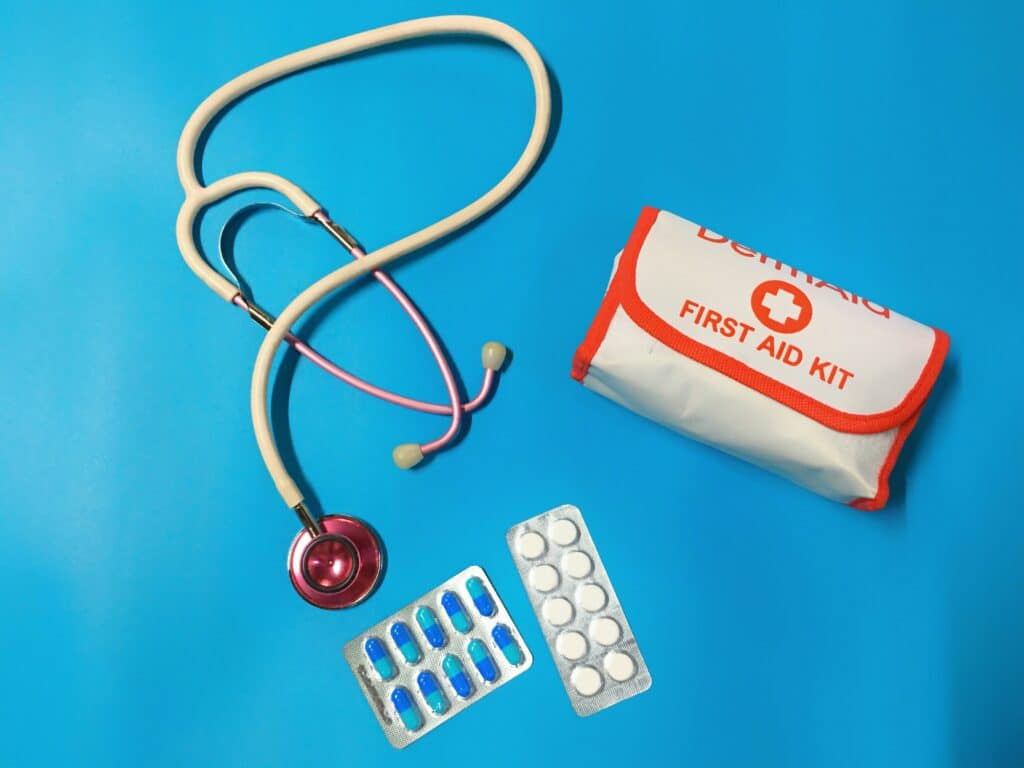
As a responsible pet owner in Singapore, ensuring the health and well-being of your pets goes beyond regular vet visits and quality food. Emergencies can happen anytime, and a well-prepared pet first aid kit can make all the difference before professional help arrives. With Singapore’s tropical climate, conditions like heatstroke, ticks, and allergic reactions are common, so immediate access to first aid supplies is essential to your pet’s safety.
Why You Need a Pet First Aid Kit
In Singapore, the pet population has been rising, with over 809,000 pets including dogs, cats, birds, and other small animals, and this growth has increased the demand for veterinary services. According to the Singapore Veterinary Association (SVA), veterinarians often face overwhelming caseloads, which means emergency preparedness at home is crucial for pet owners.

Items to include in your First aid kit for your Pet’s Safety
Ensure your pet’s safety with these essential items.:
1. Basic Medical Supplies
- Gauze Pads and Bandages: For dressing wounds or controlling bleeding.
- Adhesive Tape (Vet Wrap): Ideal for securing bandages without sticking to fur.
- Antiseptic Solution: Prevent infections, especially in humid climates where bacteria thrive.
- Digital Thermometer: A pet’s normal temperature should be between 38.3°C and 39.2°C. Temperatures above this could indicate heatstroke.
2. Specific Emergency Tools
- Muzzle: Even calm pets can bite when injured.
- Disposable Gloves: To avoid infection while treating wounds.
- Saline Solution: Great for flushing debris from the eyes, especially after walks in dusty or sandy environments like Singapore’s beaches.
3. Heatstroke Essentials
- Cold Packs: Heatstroke is a serious concern in Singapore’s hot climate. Cold packs help bring down body temperature quickly.
- Cooling Towel: Keep a damp towel in your kit to help lower body temperature.
4. Medication Essentials
- Activated Charcoal: Useful for neutralizing poisons, but only after consulting a vet.
- Antihistamines: For allergic reactions to insect bites. Always consult your vet for the correct dosage.
- Pet-Safe Pain Relievers: Human painkillers like ibuprofen are toxic to pets, so use vet-prescribed options like meloxicam.
5. Tick and Flea Treatment
- In Singapore’s tropical environment, ticks and fleas are common. Carry tick removal tools to prevent diseases transmitted by these parasites.
6. Wound Care Products
- Hydrocortisone Cream: Provides relief from minor rashes or irritations.
- Styptic Powder: Stops bleeding from minor cuts or nails trimmed too short.
7. Environmental Considerations
- Snake Bite Kit: Though rare, snake encounters can happen in Singapore’s nature reserves. Keep a snake bite kit on hand for hikes at Bukit Timah or MacRitchie.
Storing Your Pet First Aid Kit
The SVA recommends checking your kit regularly to ensure all medications and solutions are up to date. Store it in a cool, dry place to avoid heat damage to the supplies, and always keep a smaller version handy for outdoor adventures
Conclusion
A well-stocked pet first aid kit is an essential tool for any responsible pet owner in Singapore. Being prepared for emergencies, especially in a tropical climate, can make a critical difference in your pet’s recovery. Start assembling your kit today, and consult your vet for any specific recommendations suited to your pet’s health needs.
While a first aid kit helps you handle immediate emergencies, pet insurance offers long-term financial protection for more serious health issues or accidents that may require veterinary attention. Having insurance ensures you can access the best care for your pet without worrying about high costs. For more details on how pet insurance can further safeguard your pet’s well-being, check out this post on the benefits of pet insurance.
For more detailed information on veterinary practices and tips in Singapore, visit the Singapore Veterinary Association’s Pet Info Library.
Jun Hao is a passionate advocate for pet adoption, care, and volunteering. With a heart dedicated to giving animals another chance, Jun Hao spends his days promoting the joys of rescuing and rehoming pets.
“Every pet deserves love and care, and I’m here to support their journey.”
Share this:
- Click to share on WhatsApp (Opens in new window) WhatsApp
- Click to share on Facebook (Opens in new window) Facebook
- Click to share on LinkedIn (Opens in new window) LinkedIn
- Click to share on Pinterest (Opens in new window) Pinterest
- Click to share on Tumblr (Opens in new window) Tumblr
- Click to share on X (Opens in new window) X
- Click to share on Reddit (Opens in new window) Reddit
- Click to share on Telegram (Opens in new window) Telegram
- Click to email a link to a friend (Opens in new window) Email
- Click to print (Opens in new window) Print






























